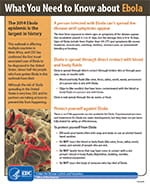UPMC is committed to keeping you informed throughout our ongoing efforts to prepare to manage any patients who may present at our facilities with Ebola symptoms. Employee safety — and the safety of our patients and community — is of utmost importance.
Important General Facts from the CDC
- Ebola only spreads when people are sick. Patients must have symptoms to spread the disease to others.
- Ebola is spread through direct contact with blood and body fluids. Ebola is not spread through the air, water, or food.
- Although the risk of an Ebola outbreak in the United States is very low, CDC and partners are taking precautions to prevent this from happening.
About Ebola

Symptoms of Ebola include:
- Fever
- Severe headache
- Muscle pain
- Weakness
- Diarrhea
- Vomiting
- Abdominal (stomach) pain
- Unexplained hemorrhage (bleeding or bruising)
If You or Someone You Know is Traveling
Travelers should remember that Ebola is not an airborne illness. There needs to be direct contact with the bodily fluids or blood of an infected individual.
The government agencies listed below continue to post timely information on their websites:
UPMC and Ebola
UPMC is incorporating the latest Centers for Disease Control and Prevention guidance into our protocols for responding to a potential Ebola patient, and we are conducting specialized training for staff.
The safety of our staff, patients and visitors is of utmost importance.
— Tami Minnier, Chief Quality Officer, UPMC

















